Oct 31, 2014. Organised as part of DesignManchester 14, NORTH: The Great Debate brought together national and regional leaders of the creative industries, politics and education at Manchester School of Art’s beautiful new Benzie Building, to discuss how the creative sector can help build what the media are now referring to as “the northern powerhouse” – a vibrant economy across the north of England.
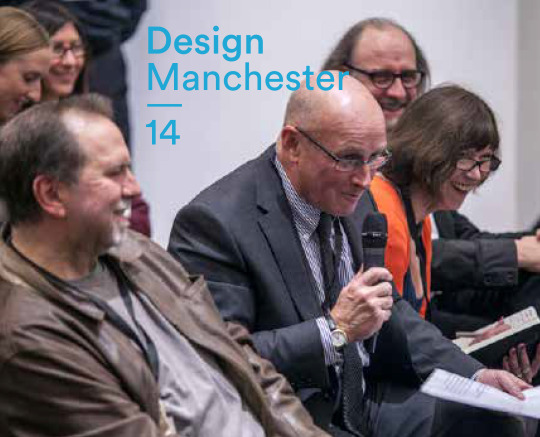
“Cities” have suddenly become a hot topic, with national politicians lining up to join the bandwagon. In the week leading up to this debate, Deputy Prime Minister Nick Clegg launched his TechNorth cluster project in Sheffield and the RSA’s City Growth Commission, chaired by Jim O’Neill, projected a £79 billion boost to the UK economy if power is devolved meaningfully. The creative sector has become one of the most important contributors to the UK economy, adding more than £70 billion a year including exports of more than £15 billion, and with employment in the sector increasing at an annual rate approaching 10%. The north of England is estimated to account for approximately a fifth of the UK creative economy and growing rapidly.
The range of expertise at the event, both on the panel and in the audience, made for an unusually well-informed discussion about issues such as skills gaps and apprenticeships, regional collaboration, tech clusters, investment and fiscal devolution.
Chaired by The Observer’s Assistant Editor Robert Yates, the panel members were Sir Richard Leese, who as Leader of Manchester City Council has long championed the city’s creative and cultural economy; Lou Cordwell, CEO of digital design company Magnetic North; Caroline Norbury, the CEO of Creative England; and Professor David Crow, the Dean of Manchester School of Art.
Malcolm Garrett RDI, Master of the Royal Designers and Co-Curator of Design Manchester, opened the batting by challenging whether the north, or the regions generally, should be in conflict with London to achieve their potential. This drew a passionate response from John Mathers, the chief executive of the Design Council, which has a big part to play in promoting the creative industries throughout the country. London and the regions are not either/or, but it is important to ensure that there are no unfair obstacles to growth. We are competing globally, and those who are buying our creative services are buying British, not from the south or the north. Collaboration is the key, or as Malcolm put it, it’s not “us and them” but “us and us”.
The buzz of the north is definitely in the air though, the Director of Ravensbourne, Professor Robin Baker explaining he’d come up from London to find out what all the fuss was about.
Companies who want to grow creative output in the region need to have access to the right talent. JD Sports, a major youth culture-focused business headquartered in Bury, has just installed a significant digital marketing production operation at The Sharp Project in North East Manchester. Chris Borkin, JD Sports’ Head of Creative, raised the importance of addressing skills and quality gaps if we are to fulfill the potential of the region. This linked closely with a question asked by Lilian Barton, former Chair of RSA North West and Lecturer at Manchester Metropolitan University Business School, who wanted to know how industry, education and government can retain emerging talent in the region and attract more from outside.
This debate was not about big controversies or widely differing views – though there was a plaintive cry from Tech Dept’s CEO Dan Kirby, from Sheffield, not to make the discussion too Manc-centric, and Maria Stukoff of Sony Computer Entertainment, based in Liverpool and Runcorn, spoke passionately about the need to address the disconnect between different creative centres and facilities.
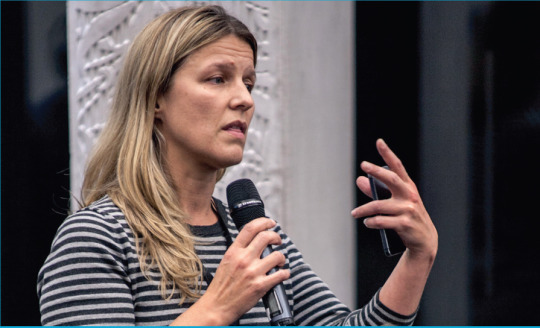
Dr Maria Stukoff
This was an opportunity to take a sober and informed look at where we are and how we can best play the opportunities before us. Education and skills present challenges, David Crow admitted, particularly in communicating the value of arts education to schoolchildren looking at high fees and student loans. The presence at the debate of Sorrel Hershberg, Director of the Sorrell Foundation’s National Art & Design Saturday Clubs, and Lucy O’Rorke, Director of the Open Futures skills programme for primary schools, underlined the importance of this issue. But the number of students staying and returning to the area is healthy and growing. We must not underestimate the experience our graduates gain from spending time in other parts of the world – and equally, we greatly benefit from being an attractive destination to some of the best global talents. In the obsessive media focus on immigration, Sir Richard Leese added, we should reinforce the importance and value of being open for business.
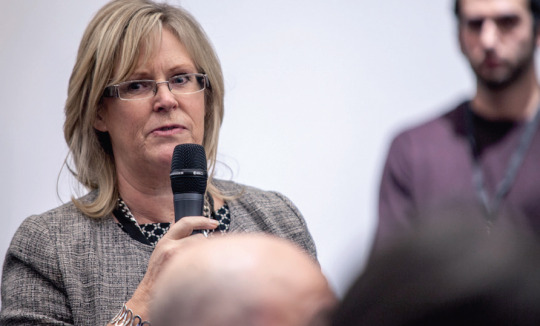
Sally Joynson
Sally Joynson, the Chief Executive of Screen Yorkshire, said that while much of the debate about the “northern powerhouse” has centred on building new railway lines, we should not wait for that and focus on encouraging connections and collaboration. Investment both in the industry and in infrastructure will be key in the long term, so what kind of devolution do we need from central government to help achieve this, asked Laura Harper, partner at Shoosmiths. The point was reinforced by Naomi Turner of the All-Party Parliamentary Design and Innovation Group: the creative industry in the region should formulate its needs, so that parliamentarians and government can form constructive and meaningful responses. Those needs, responses and strategies, Manchester University’s Jackie Carter stressed, should be evidence-based to make sure that progress is built on solid foundations. Redressing the balance of research and culture funding allocated to London and the rest of the country by the Arts & Humanities Research Council and Arts Council England would help, David Crow noted. But while fulfilling the region’s potential will ultimately require fiscal devolution, Sir Richard Leese acknowledged that the complexity of this issue means it is unlikely to be achieved in the immediate term. Meanwhile there are many forms of devolution that can be more easily delivered by ministers and government departments – including in skills training – the importance of which should not be overshadowed by an ultimate aim which is a little further away.
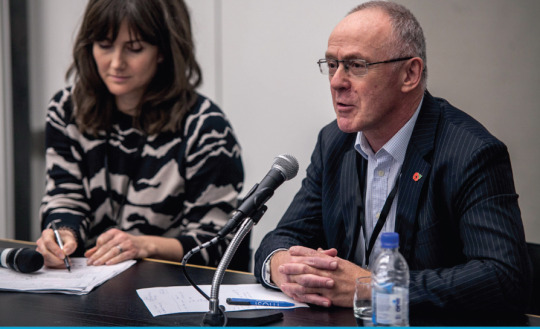
Lou Cordwell and Sir Richard Leese
A recurring theme highlighted by Lou Cordwell was the need to create the right narrative for the region to help attract talent, investment and growth. There was a powerful sense among participants as they talked over drinks afterwards that Design Manchester is a big part of that narrative, and that this event, though focused specifically on the creative industries in this region, is evidence that the national debate about devolution is well under way and focused on achieving results.
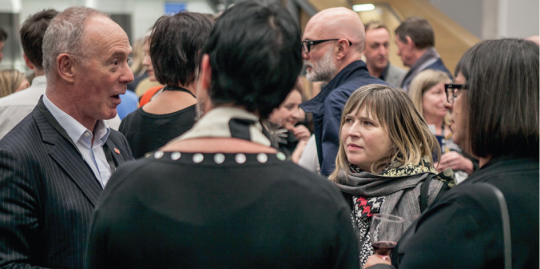
Sir Richard Leese, Lucy O’Rorke, Sarah Elderkin and Professor Natalie Brett among those continuing the discussion over a drink.
NORTH was hosted by Manchester School of Art and sponsored by Images&Co with support from the All-Party Parliamentary Design and Innovation Group and Shoosmiths. It was part of the Design Manchester 14 Festival.
Photos © Sebastian Matthes


